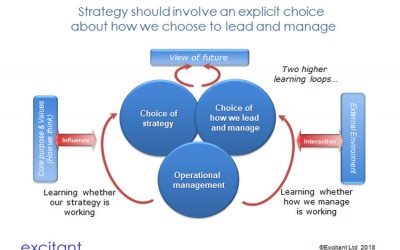Our blog articles about strategy, people, performance, decision making, balanced scorecards and culture change
Here is a way into my blog articles, over 300 of them: It is structured into major topics areas linking to the most articles in each topic area. These cover:

- The Strategy Zone
- Communicating & socialising Strategy: An Executive’s guide
- The Decision Improvement Zone:
- The Culture & Behavioural Change Zone
- The Performance Management Zone: A guide to understanding the management of performance
- Modern Balanced Scorecard Zone
- The 4G Strategic Management Zone
- How we look at our organisations and how we manage: The Paradigm Shift Zone
- Thought provoking articles about how we manage our organisations
Simply scroll down through the various topic areas and articles…
1) Strategy choice, approach and implementation articles: Most recent first
Facilitating Strategy Workshops using Vision and Tangible Futures
When facilitating a strategy workshop with a team, you need a view of where the organisation is going. Clients often say they want to work on their "Vision" or vision statement. We do that. However, they quickly realise that a "Tangible Vision", or "Tangible Future"...
Excitant Thought Provoker: How has Covid changed how we think about our strategy?
.Three simple thoughts about how teh pandemic should be shaping how we think about our strategy, and how we manage our strategy (after a long break from my emails) The past two years have taught us how to manage a far more flexible workforce in dramatically changing...
Facilitating Strategy Workshops to promote quality of conversation, thinking and decisions
Having facilitated strategy workshops for clients for over 25 years, a number of core principles and a common approach has emerged. It has become clear to me that there are three core components for a successful strategy workshop. They are Quality of conversation...
Excitant Thought Provoker: Perspectives on Strategy – what it is and is not
My irregular newsletter covers a wide range of ways of looking at your Strategy. This one covers: Some common, yet inadequate, views of strategy: often necessary: never sufficient…Typical characteristics or “A strategy”So, what is “Strategy”?Strategy as a...
Three thoughts on strategy: Persistent, a habit, and humble
In a learning organisation, there are three ways to look at your strategy: one is to consider your strategy as a habit. First let us explore : Strategy as a persistent pattern of behaviourStrategy as a habit (or even an addiction)Humble, yet persistent, strategy Three...
The case for humble strategy: and how we can achieve it
I want to make the case for humble strategy. There is a danger that we can own and become too attached to our strategy because we have researched it, created it and eulogised about it. However we need to be dispassionate about it and even humble. ...
2) Communicating & Socialising Strategy articles: Most recent first
To socialise your strategy, create a shared mental model
Socialising strategy, instead of merely communicating it, is an idea my clients love. But how to do that? Here are six tips to help you socialise your strategy, by creating a shared mental model of your strategy and its underlying thinking. That shared mental model...
My book should have been called “Socialising Strategy”
After my book 'Communicating Strategy' was published, I realised I should have called it 'Socialising Strategy'. Getting strategy into day to day conversation and decision making When I wrote Communicating Strategy, I was trying to get across how important it was to...
Communicating Strategy – Ten heresies
During the initial research for my book, "Communicating Strategy" I found a web site that suggested: “You should not communicate your strategy, as it will leak your strategy to the competition”. I was incensed by this idea. I hope you are also, because, as you will...
Line of sight and the golden thread: Understanding the difference
Line of sight and The golden thread are often talked about but also often confused. For us, they are two different things and the distinction is important. These are both about how individuals and teams in the organisation relate to the organisation’s goals, but in...
Insight 5: It’s about the quality of conversation:
Insight 5: It’s about the quality of conversation: It is good to force out arguments, ambiguity and conflict This insight is part is a series of six insights into strategy, people and performance, derived from working with my clients in 2013. When working on strategy...
Insight 3: Communicating strategy is not enough: Strategy needs to be socialised
Insight 3: Communicating strategy is not enough: Strategy needs to be socialised This insight is part is a series of six insights into strategy, people and performance, derived from working with my clients in 2013. Ever since I started talking about strategy being...
3) Decision making and decision taking articles: Most recent first
Learning from failure: A checklist to improve how you learn
Do you learn from failure? Wouldn't it be better to learn, before they fail? This article is about how to better learn from your projects, and be better at implementing those “Lessons learnt”. It includes a checklist that a client found really...
Decision making: The importance of diagnosis and framing a decision
Have you ever been in a meeting where a topic comes up and the conversation becomes: Person A: “I think that is an HR problem.”Person B: “No, it’s an IT problem.”Person C: “It is a problem of funding.”Person D: “I think it is caused by customers and marketing.” ...
Thinking fast and slow: How we really make executive decisions
Last year I wrote a couple of blog posts about “Thinking fast and slow with strategy” that became some of my most visited posts. The posts were inspired by the book by Daniel Kanhemann, “Thinking Fast and Slow”. I strongly recommend you get a copy and read it if...
Decision Making and Decision Taking: Why do we not notice the difference
In some of my other blog posts I make a clear distinction between decision making and decision taking. When we make a decision we (literally) construct that decision: decision making is decision construction. When we take a decision we commit to action: decision...
The six frogs and decision making
Here is a question for you: There are six frogs on a wall. Two frogs decide to jump off. How many frogs are now on the wall? OK, I’ll save you the embarrassment: there are six. Why? The two frogs only decided to jump off; they did not actually jump off. Sorry!...
Helpfully stolen accountability – a lesson in delegation, accountability and decision making control
Let me tell you the story of the curious case of missing financial control. In one organisation we worked with, the objective was to develop the autonomy and capability of various business units, located in separate properties around the country. The company ran...
4) Performance management, various types and perspectives. Most recent articles first
The tyranny of targets – a performance management disease
The tyranny of targets is the effect on an organisation of excessive and inappropriate target setting. It occurs when the need to achieve targets, and avoid the consequence of missing targets, overcomes common sense and doing the right thing, creating an adverse...
Measure mania – a nasty performance management disease
Measure mania is a disease of performance management. it is easily caught and spread. It is a compulsive behaviour to measure absolutely everything. How do we recognise measure mania? Measure mania is easily recognised in organisations. The organisation will be...
Obsessive compulsive target setting – a nasty disease
Obsessive compulsive target setting is a disease of organisations and regulators. It is also loved by the media. It is a disease easily caught by those starting in performance management. How do we recognise obsessive compulsive target setting Obsessive compulsive...
Helpfully stolen accountability – a lesson in delegation, accountability and decision making control
Let me tell you the story of the curious case of missing financial control. In one organisation we worked with, the objective was to develop the autonomy and capability of various business units, located in separate properties around the country. The company ran...
Why use a KPI? Beware the KPI substitution heuristic
Why use a KPI? There is a lot of discussion about which particular measure, indicator or KPI to use. There is far less discussion about why use a KPI in the first place. Actually, the reason is often a heuristic. Let me explain.... To solve difficult questions, we...
The Chief Executive and the Lightbulb: How we think about performance management
As I talked, I noticed that the Chief Executive was no longer listening. She had gone into that state of deep thought, staring up and away into the distance; thinking intensely: thinking about something - I had no idea what. I decided not to disturb those thoughts...
5) How to achieve Cultural and Behavioural change. Most recent articles first
The Gorillas, bananas and hosepipe: How we embed & learn behaviour
The gorillas, the bananas and the hosepipe. An allegorical story that explains how we learn and embed behaviours in our organisations. I heard a story about a rather sad experiment on Gorilla behaviour. I understand it is not true, it is just a story. I want to be...
Culture myth: People don’t like change. Yes they do!
You will have heard someone say, “People don’t like change”. Did you ever stop to think why they said it? I suggest that someone who says "People don't like change" is using it as an excuse for the failure of their own strategy for change (If they had one at...
A Compelling Imperative for Strategic change
The Chief Executives I interviewed whose strategy required significant change in culture, started with a compelling imperative for change. They made sure their people understood the rational and emotional reasons for the change. This article explains how a compelling...
The Burning Platform: what is a better metaphor for change
The burning platform is a popular metaphor for how to bring about organisational change. However I think it is 1) Insensitive and 2) An unhelpful metaphor for change. I will explain how Chief Executives actually encourage and explain the need for change in their...
What is the Dark Matter of Organisational Performance and Success?
In this article, I explore the idea of, metaphorical, dark matter and dark energy, in organisational success and organisational performance. Jim Collins, (Author of Good to Great and Built to last) suggests we have missed this important dark matter. I offer ways you...
Organisations do not exist: Think social systems
Whilst organisations appear to be organised, social systems emerge naturally and connect, despite organisational structures and boundaries. In reality, we need to view and understand our Organisations as Social systems. If we forget that we miss how people, human...
5) Modern Balanced Scorecards. Most recent articles first
Common Balanced Scorecard problems and their underlying causes
This article looks at the most common balanced scorecard problems that we see clients face. It suggests typical underlying causes of these individual balanced scorecard problem and provides links to more detailed articles that will help you. The presenting...
Ensure your balanced scorecard project succeeds: Five keys to success
How can you ensure your balanced scorecard project succeeds? This article is based on 25 year's experience, many successes and a clear understanding of why they fail. This applies to all performance management projects, not simply those using a balanced...
The myths and statistics behind “Why balanced scorecard projects fail?”
This is one of a pair of articles: This one looks at the myths behind "Balanced Scorecard projects fail". The second looks at the reality of why they might fail and what you can do about them. First let us look under the detail of the most some common myths about the...
Understanding & using balanced scorecard perspectives, and cause and effect
Understanding the perspectives in a balanced scorecard is fundamental to their correct use. The balanced scorecard perspectives create the cause and effect relationship that tells the story of the strategy. These articles look at the various perspectives,...
Correcting Balanced Scorecard History: an insiders perspective
A lot of nonsense is talked about the history of the Balanced Scorecard. In this series of articles, I make a plea for historical accuracy, describe some of the balanced scorecard history and their development from an insider’s perspective. This article summarises...
Balanced Scorecards and steering wheels
As you browse the web or read articles you will come across various Balanced Scorecards as steering wheels, jigsaw puzzles or other symbolic pictures. The Tesco Steering wheel is well known. In this article I want to explore why these balanced scorecards and steering...
6) Fourth Generation Strategic Balanced Scorecards and modern methods of management. Most recent articles first
Three thoughts on strategy: Persistent, a habit, and humble
In a learning organisation, there are three ways to look at your strategy: one is to consider your strategy as a habit. First let us explore : Strategy as a persistent pattern of behaviourStrategy as a habit (or even an addiction)Humble, yet persistent, strategy Three...
Learning from failure: A checklist to improve how you learn
Do you learn from failure? Wouldn't it be better to learn, before they fail? This article is about how to better learn from your projects, and be better at implementing those “Lessons learnt”. It includes a checklist that a client found really...
Is “How we manage” missing from our strategic thinking?
Something has been bothering me for a while. I have noticed that organisations rarely consider "How we manage" when they are thinking about their strategy. If they do think about how we manage, it is not explicit. It is not management by design. I...
4G Strategic Balanced Scorecard Principles: How we think about strategy
Clients are asking us, "How do we move away from an annual strategy process, to treating strategy as a process of continuous learning?" Traditional Strategy: deliberate, top down and annual First, let us look at how strategy is commonly described. Strategy as an...
Organisational agility requires two preceding capabilities
Many organisations want to be agile. The problem is that agility requires two earlier steps. You can have an agile organisation, but if that agility is never exploited, then it is a wasted resource. Organisational agility is in fact a three-part problem (and I'll...
Upside down organisation charts: Using them effectively
Upside down organisation charts are re-drawn with a purpose: to invite executives to think differently about their organisation and their role. This article explains how to draw them upside down (it is not simply turned upside down) and how the changed perspective...
7) Paradigm shifts that affect our organisations and how we manage.
Most recent articles first
What is a paradigm? What is a paradigm shift?
To avoid clichés and platitudes, let us be clear what is a paradigm, and therefore what is a paradigm shift. The phrase ‘Paradigm shift’ has become a cliché. This overuse is causing the phrase to lose its impact. Are you, like me, fed up with any change being...
4G Strategic Balanced Scorecard Principles: How we think about strategy
Clients are asking us, "How do we move away from an annual strategy process, to treating strategy as a process of continuous learning?" Traditional Strategy: deliberate, top down and annual First, let us look at how strategy is commonly described. Strategy as an...
Organisations do not exist: Think social systems
Whilst organisations appear to be organised, social systems emerge naturally and connect, despite organisational structures and boundaries. In reality, we need to view and understand our Organisations as Social systems. If we forget that we miss how people, human...
The Balanced Scorecard is not a technical tool: It is a social tool!
Most of what we see in "Balanced scorecards" are technical tools. Many of the questions we see and hear on balanced scorecard forums are technical questions. Many balanced scorecard projects are seen as, primarily, technical projects. This applies to of all...
A Culture of Performance: What do we mean and how do we create one?
What do we mean by a culture of performance, and how do you create a culture of performance, avoiding dysfunctional behaviours and other games that the wrong culture can encourage? If you are are you concerned about the culture and behaviours that performance...
7) Thought provokers, designed to make you consider thinking differently about how we manage and our organisations:
Most recent articles first
Excitant Thought Provoker: How has Covid changed how we think about our strategy?
.Three simple thoughts about how teh pandemic should be shaping how we think about our strategy, and how we manage our strategy (after a long break from my emails) The past two years have taught us how to manage a far more flexible workforce in dramatically changing...
Excitant Thought Provoker: Perspectives on Strategy – what it is and is not
My irregular newsletter covers a wide range of ways of looking at your Strategy. This one covers: Some common, yet inadequate, views of strategy: often necessary: never sufficient…Typical characteristics or “A strategy”So, what is “Strategy”?Strategy as a...
Excitant Thought Provoker: On making sense, strategy & decisions in complex contexts (20/10)
Have you thought about the how the environment are you in is behaving, whether that be Simple, Complex, Complicated or Chaotic? …and what that means for how you make sense of situations and make decisions? Importantly, if you knew how your context was behaving, would...
Introduction to the Cynefin framework for making sense of your context
I have worked from a perspective of organisations being complex social systems for a long while. A few years ago I came across a framework that was really good at explaining how different types of systems have quite different characteristics that determine how...
Excitant Thought Provoker: On Covid-19: Where are we? Lessons, and the future? (Newsletter 2020/08)
Given where we are with Covid-19, I thought I would share six short thoughts on the situation today, and some questions to ponder: What is it about Covid-19 that is fundamentally driving behaviours?The extent of adaptation and change we have seen has been...
Excitant Thought Provoker: On Scenarios, Forecasting and Shaping the future (Newsletter 2020/06)
Given all that is going on, I thought thge topic of Scenarios, Forecasting and Shaping the future seemed a good theme to get the thinking flowing…. (This was sent to my clients June 2020) Three big topic & questions In the world of strategy, I live in, there are...
Of course the best way to find out what we think is to Contact us












